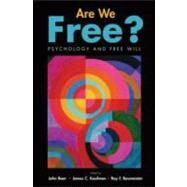- ISBN: 9780195189636 | 0195189639
- Cover: Hardcover
- Copyright: 2/25/2008
Do people have free will, or this universal belief an illusion? If freewill is more than an illusion, what kind of free will do people have? How canfree will influence behavior? Can free will be studied, verified, andunderstood scientifically? How and why might a sense of free will have evolved? These are a few of the questions this book attempts to answer. People generally act as though they believe in their own free will: they don'tfeel like automatons, and they don't treat one another as they might treatrobots. While acknowledging many constraints and influences on behavior, peoplenonetheless act as if they (and their neighbors) are largely in control of manyif not most of the decisions they make. Belief in free will also underpins thesense that people are responsible for their actions. Psychological explanationsof behavior rarely mention free will as a factor, however. Can psychologicalscience find room for free will? How do leading psychologists conceptualizefree will, and what role do they believe free will plays in shaping behavior? In recent years a number of psychologists have tried to solve one or more ofthe puzzles surrounding free will. This book looks both at recent experimentaland theoretical work directly related to free will and at ways leadingpsychologists from all branches of psychology deal with the philosophicalproblems long associated with the question of free will, such as therelationship between determinism and free will and the importance ofconsciousness in free will. It also includes commentaries by leadingphilosophers on what psychologists can contribute to long-running philosophicalstruggles with this most distinctly human belief. These essays should be ofinterest not only to social scientists, but to intelligent and thoughtfulreaders everywhere.






